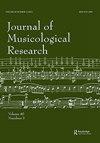超越音乐的诠释
IF 0.4
2区 艺术学
0 MUSIC
引用次数: 12
摘要
音乐表演作为一种“诠释”的概念不能追溯到19世纪40年代之前,然而我们不假思索地将这个术语作为过去任何音乐的特权表演的同义词。追溯这个隐喻的历史和前史及其用法,可以揭示出以前时代更为丰富的音乐制作模式的衰落,以及当代“历史主义”表演中的审美困境。这个比喻的局限性建议我们“超越演绎”,更倾向于体验和直觉的音乐创作理念。本文章由计算机程序翻译,如有差异,请以英文原文为准。
Beyond the Interpretation of Music
ABSTRACT The idea of a musical performance as an “interpretation” cannot be dated before the 1840s, yet we use the term unthinkingly as a synonym for a privileged performance of any music from the past. Tracing a history and pre-history of the metaphor and its usage sheds light on the eclipse of more richly textured models of music-making from previous eras as well as on an esthetic predicament within contemporary “historicist” performance. The limitations of the metaphor suggest moving “beyond interpretation” in favor of more experiential and intuitive notions of making music.
求助全文
通过发布文献求助,成功后即可免费获取论文全文。
去求助
来源期刊
CiteScore
0.30
自引率
0.00%
发文量
17
期刊介绍:
The Journal of Musicological Research publishes original articles on all aspects of the discipline of music: historical musicology, style and repertory studies, music theory, ethnomusicology, music education, organology, and interdisciplinary studies. Because contemporary music scholarship addresses critical and analytical issues from a multiplicity of viewpoints, the Journal of Musicological Research seeks to present studies from all perspectives, using the full spectrum of methodologies. This variety makes the Journal a place where scholarly approaches can coexist, in all their harmony and occasional discord, and one that is not allied with any particular school or viewpoint.

 求助内容:
求助内容: 应助结果提醒方式:
应助结果提醒方式:


